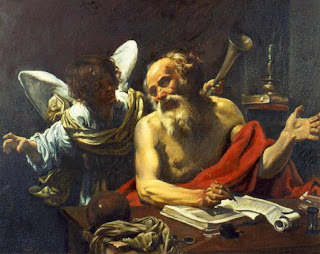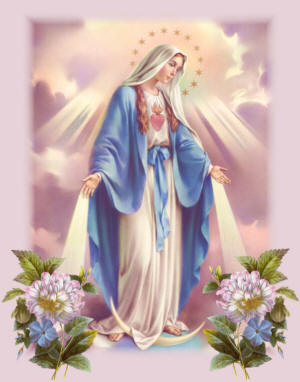Twenty One Saints Everyone Must Know XVIII - XVI
XXI - XIX: Saints Gregory the Great, Ignatius of Antioch, Polycarp
 | |
| St. Jerome |
18-St. Jerome (347 AD – 420 AD) [Doctor of the Church]
St. Jerome is a great ascetic who lives a hermetical lifestyle in the
deserts and monasteries for some periods of his life. He is a prolific writer
best known for his translation of the Septuagint into Latin. His writings also
include commentaries on Scriptures, letters to friends and heretics, and the
collections of previous Church Fathers. Most of his writings have a
rhetorical/polemic nature, whereby usually he defends the orthodox doctrines of
the Church against heretics and schismatic groups. It is not possible to
discuss his works in any comprehensive manner in this tiny blog post. However,
to have a taste of this fervent and passionate defender of orthodoxy, one of
his letters will suffice. In response to a monk named Jovinanus, whose
theological stances have been condemned by the Council of Milan in 390 AD.
Copies of his writings are sent to St. Jerome, and a request is made that
Jerome composes a refutation as a response to Jovinian’s errors. Jovinianus
makes several statements that depart from the positions of the universal
Church. He claims that consecrated virgins and married women are equal in God’s
eyes; everyone receives an equal reward in heaven; food eaten in thankfulness
is as rewarding as fasting and abstinence. To begin with, St. Jerome labels
Jovinanus as the “Epicurus of Christianity” and designates his style of writing
as “barbarous,” while his “language” is “vile” and nothing more than a “heap of
blunders” (Against Jovinanus, Book I, chapters 1). St. Jerome goes on to
explain the classical Catholic position on Consecrated Virginity and
marriage. He says that we do not
follow the heretical teachings of Marcion and Manichaeus who “disparage
marriage”; nor do we fall for the errors of Tatian, who deemed “all
intercourse” and all “food” to be “impure” (Against Jovinanus, I, 1). Instead,
we consider marriage to be “honourable among all, and the “bed” to be
“undefiled” (Against Jovinianus, I, 1). However, “while we honour marriage, we
prefer virginity.” St. Jerome is echoing the sentiment St. Paul expresses on
the subject in 1 Corinthians 7. After presenting his thorough refutation of the
heretic, St. Jerome concludes his treatise with a warning to the Romans, where
Jovinianus was spreading his heresy. He tells the Christians in Rome to
“beware” of Jovinanus’ name because it is derived from the “idol,” Jove
(Against Jovinianus, II, 38). St. Jerome’s vigorous defense of Church teachings
and doctrines reveal his great zeal for the Lord and His Bride, the Holy
Catholic Church.  | ||
| St. John Chrysostom |
St. John is a great preacher of the gospel whose eloquence and skill of persuasion earn him the title ‘golden mouth.’ As a Church Father, St. Chrysostom is greatly venerated for his contributions to liturgy and theology as well. He preaches powerful sermons against all the corruption in the Church and within the civil authority, which is what ends up causing him his episcopacy in the See of Constantinople. Demonstrations occur in Antioch to protest the heavy taxes levied by Emperor Theodosius I. The demonstrators go as far as destroying statutes of the emperor. To appease Theodosius, the Bishop of Antioch goes to Constantinople, leaving the pulpit to Chrysostom. During the period of the Bishop’s absence, St. John composes and delivers 21 homilies that describe proper Christian behaviour and its incompatibility with the destructive attitude witnessed earlier. As a result of these homilies, people of Antioch reflect deeply on their behaviour and a large number of pagans convert to Christianity. The emperor’s anger is also abated. Later, St. Chrysostom is made the Archbishop of Constantinople, which at the time is a very prestigious See, and his departure from Antioch is done in secret because it would stir protests due to his popularity and prominence as a preacher. As an Archbishop, he refuses to entertain any extravagant and luxurious gatherings of clergy and civil servants as well. His support of Origin puts him at odds with the Archbishop of Alexandria, while his severe denunciations of lavish dressing and immodesty of women clothing stirs Eudoxia, the wife of the Eastern Emperor, into hostility and malignity towards him. Eudoxia and the Patriarch of Alexandria, along with others, form an alliance against St. John, resulting in his removal and banishment. However, the people of Constantinople love John too much to let him go. They protest against the sentence, and St. John is brought back to his position. Shortly after, a silver statue of Eudoxia is erected very close to his cathedral, and grand ceremonies are celebrated for the occasion. St. John of course, cannot ignore this extravagancy. Instead, he writes a sermon comparing Eudoxia to Herodias and himself to St. John the Baptist in an analogy. This time, he is banished to the Caucuses. He continues to write letters that greatly influence public opinion as well as ecclesial authorities in influential Sees such as that of Rome and Milan. The latter intervene, but they are unsuccessful in bringing him back. Moreover, his letters irritate his enemies further, banishing him further to Pitiunt. He does not reach this destination. He dies on the way there. What I admire about this Saint is his courage, eloquence and knowledge of the Scriptures.
 |
| Prophet Elijah |
Prophets of the Old Testaments are all considered Saints in the Catholic Church. St. Elijah is a powerful figure from the Old Testament whose sanctity and holiness enable him to be assumed into heaven without experiencing physical death. His assumption serves as a precedence of the Blessed Virgin’s assumption, which takes place approximately 9 centuries later. St. Elijah is also a type of St. John the Baptist, meaning that as a character in the Old Testament, his significance is not limited to the Old Testament, but rather he serves as a foreshadow for another character who will appear in the New Testament. St. Elijah preaches against the idolatry and sinfulness of Israel that has fallen into the hands of a deprave king, King Ahab. Likewise, St. John preaches against King Herod who, as I previously note, marries his brother’s wife while his brother is still alive. Prophet Elijah leads an ascetic lifestyle alone in the desert for most of the time. St. John also lives in the “wilderness,” eating “locust and wild honey” (Mathew 3:4). Prophet Elijah is opposed by a woman named Jezebel, the wife of the King, and St. John is also opposed by Herod’s prospective wife, who instructs her daughter to request John’s head on a platter. Moreover, the Scripture itself testifies to John having the “power and spirit of Elijah” (Luke 1:17). Elijah demonstrates strength and fortitude not just in the austerity of his lifestyle, but also in his convictions and faith. With a simple prayer, he blocks “rain” and brings it back (1 Kings 17:1). The oath he uses frequently is “As the Lord, the God of Israel lives, whom I serve” (1 Kings 17:1, 18:15). The oath underlines the nature of God that Elijah is serving. He is a living God who is active and at work in His creation. He is a personal God who communicates and speaks to His children. Prophet Elijah also includes the phrase, “whom I serve” in his oath to denote that personal relationship that he has with God. It is a relationship that is not delusional or a thing of his fancy. Instead, it is a concrete exchange between the Creator, who is invisible albeit real, and His creature whose faith grants him a sense of certitude in that which is indiscernible to the human senses. Another remarkable aspect of Elijah is his complete disregard for comforts of the flesh in order to maintain the spiritual strength necessary to carry out his mission in life. Rather than living in a luxurious house and enjoying the high prestige granted to Ba’al’s priests, he prefers to live in the desert and in caves as long as he remains faithful and obedient to the LORD. Consequently, God does not reject any of his prayers, including when Elijah requests “fire” from heaven for his “sacrifice” to be “burned” as a proof that the LORD is God (1 Kings 18:38).



Catholic Church today doesn^t teach the nonsense that a virgin is more pleasing to god than a married person.That was from a time where a maniacal cult of virginity plagued church fathers.Tell Peter & most of the apostles who were married this nonsense.It was believed at the time that Christ was born not naturally but magically thru the womb of Mary.No catholic is bound to believe this.holiness is based on one^s charity & not on^s state
ReplyDelete